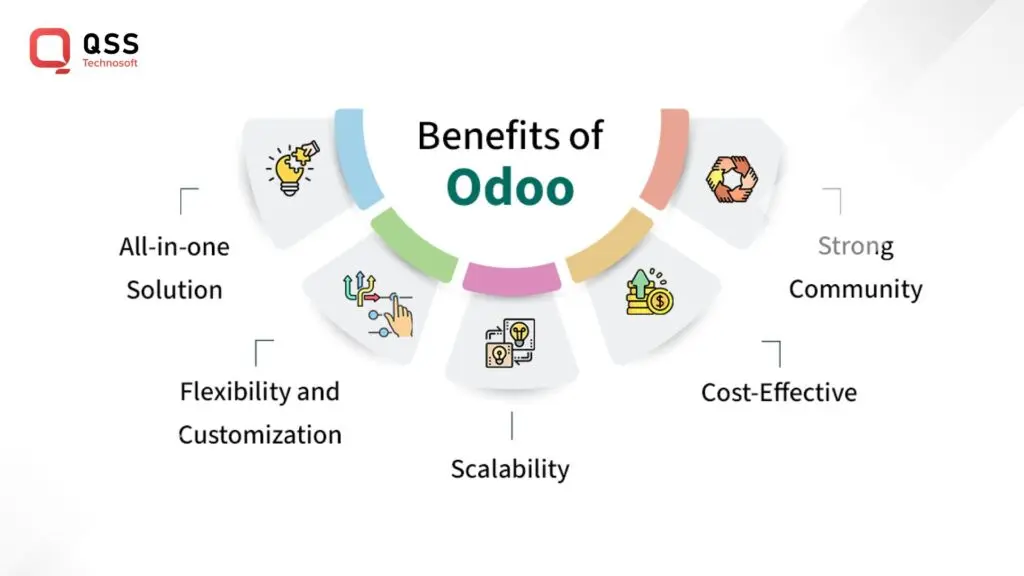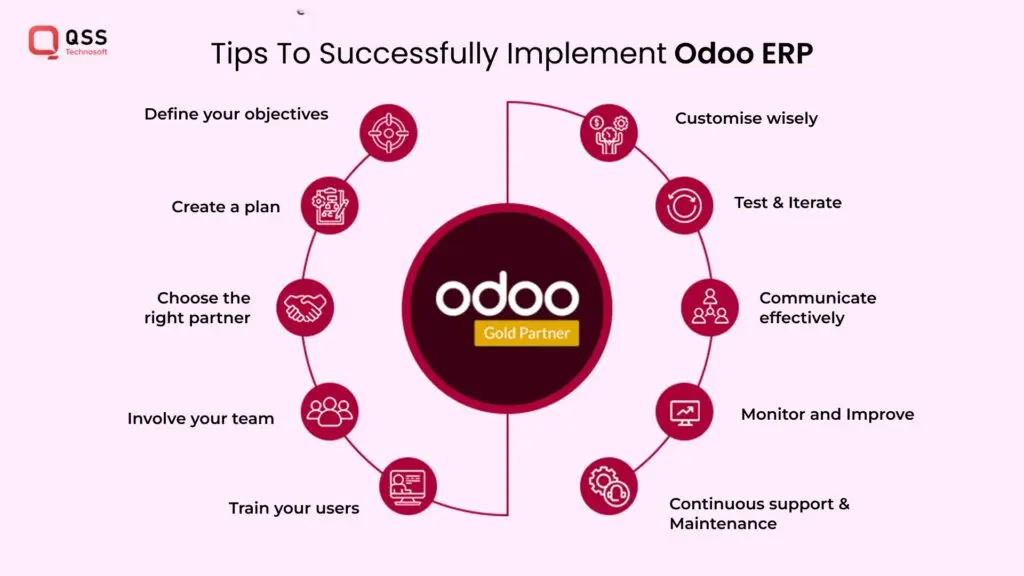In today’s rapidly evolving business landscape, choosing the right Enterprise Resource Planning (ERP) system can be a game-changer. Odoo ERP stands out with its open-source framework, modular design, and affordability, appealing to small and medium-sized enterprises (SMEs) that require a flexible, customizable solution. Unlike traditional ERPs like SAP, Oracle, or Microsoft Dynamics, Odoo offers unparalleled flexibility, making it a popular choice for businesses looking to streamline their operations. In this blog, we will explore the key considerations for a successful Odoo ERP implementation, ensuring businesses can maximize the platform’s benefits.
Why Odoo ERP? Benefits and Unique Value Proposition
Let’s dive into the benefits and unique value propositions for Odoo ERP-

Open-Source Flexibility:
Odoo’s open-source design provides unparalleled flexibility, allowing businesses to modify the system to their needs, without the high cost that ERP systems traditionally carry. Through the use of its flexible modules’ companies can save money on a complete solution and focus on the OpenERP modules they require like sales, CRM as well as warehouse management.
Modular Approach:
Odoo’s modular architecture allows companies to pick and apply specific functions while reducing the amount of work and expense. For instance, a retail firm could select only the CRM, inventory, or accounting software, while scaling up as the company’s operations expand. However, rivals like SAP and Oracle provide complete packages which may not be as adaptable for SMEs because of higher prices and rigid structure.
Also Read:- Guide & Cost to develop Subway Surfers Like App
Key Considerations for Successful Odoo ERP Adoption
Here are the key considerations that will lead you towards a successful Odoo ERP Adoption-

1.System Customization and Integration
- Tailoring to Business Needs: Customizing Odoo to fit specific business processes is essential for a successful Odoo ERP Adoption. Whether it’s CRM, supply chain, or accounting, businesses must carefully design the system to reflect their unique workflows. Different industries, such as retail, manufacturing, and healthcare, have customized Odoo to meet their needs, ensuring optimal efficiency and performance.
- Integration with Legacy Systems: Integrating Odoo with existing systems like payroll, HR, or third-party applications can be challenging. Odoo requires more manual oversight for integrations, unlike SAP, which offers more out-of-the-box solutions.
2.User Training and Adoption
- Effective User Training Programs: Adoption by users is vital to the success of an ERP implementation. Without adequate training, employees might have difficulty navigating Odoo’s different modules, resulting in difficulties. Regular training programs that are specific to various departments will help users use the software effectively.
- Competitor Comparison: Microsoft Dynamics is known for offering extensive training support, but Odoo’s open-source model provides strong community-driven resources that help businesses reduce training costs.
3.Change Management and Stakeholder Buy-In
Addressing Resistance to Change:
One of the major problems that businesses face when it comes to the implementation process of the Odoo ERP software is resistance to changes. It is essential to engage the key stakeholders early and implement an incremental rollout plan to avoid disruptions. A clear communication strategy and the ability to address concerns in advance can help ease the process.
Competitor Comparison:
Although SAP and Oracle typically require extensive changes in management because of their complex designs, Odoo’s modular structure makes it easier to transition, especially for SMEs.
Data Migration and System Testing
Efficient Data Migration Strategy:
Data migration is among the most difficult elements in ERP implementation. Companies must carefully map and clean their data before transitioning to Odoo’s modules to avoid problems after implementation.
System Testing Phases:
Continuous testing is vital to ensure that the system functions effectively after deployment. Testing phases comprise unit tests, integration tests and user acceptance tests (UAT).
Scaling Odoo for Growing Businesses
Scalability and Performance Optimization:
As companies grow, Odoo can easily scale to accommodate new business operations without having to undergo a complete overhaul. Smaller businesses can be started, and then add more Openerp modules, such as Sales, CRM, Accounting, Inventory, Manufacturing, HR, and Project Management, leading to organized business management solutions, (e.g. managing their supply chain or staffing) when they expand.
Competitor Comparison:
Although SAP is generally suited to large companies Odoo’s flexibility as well as its scaling capabilities make it a great choice for businesses growing and need an economical solution.
Support and Maintenance Considerations
Odoo provides businesses with the option of picking between community-driven and paid enterprise support. The company also provides a variety of third-party extensions and plugins to further personalize. Although SAP and Oracle provide standard support services, Odoo’s free-source environment makes it more adaptable and cost-effective.
Odoo’s open-source design is an affordable ERP system compared to traditional ERPs such as SAP and Microsoft Dynamics, particularly for SMEs. However, companies should consider additional costs for customization, integration, as well as long-term support.
To future-proof their ERP system, businesses must stay up to date with Odoo’s frequent updates, including AI-driven modules and advanced analytics. Planning for long-term growth and scalability ensures that Odoo continues to meet the business’s evolving needs.
Also Read:- How to boost Your Cloud mastery and AWS with Amazon Q?
Conclusion
Odoo ERP’s open-source flexibility modularity, and scalability give SMEs an economical alternative to conventional ERP options like SAP or Oracle. But, to ensure success with an Odoo implementation, companies need to be aware of customization as well as training for users as well as change management and integration problems. When they are careful about planning and engaging important stakeholders early, organizations can fully utilize Odoo’s potential and enjoy long-term success.
QSS Technosoft specializes in custom Odoo ERP implementations, helping companies streamline their processes and increase their efficiency. From customization to data transfer and training of users, we will ensure that you have a smooth and successful Odoo implementation that is in line with your specific business objectives. Contact us to get a free consultation.
We are proud to mention that our work has been recognized by leading B2B reviews and research platforms like GoodFirms, Clutch, MirrorView, and many more.


Odoo ERP Adoption: Key Considerations for Success